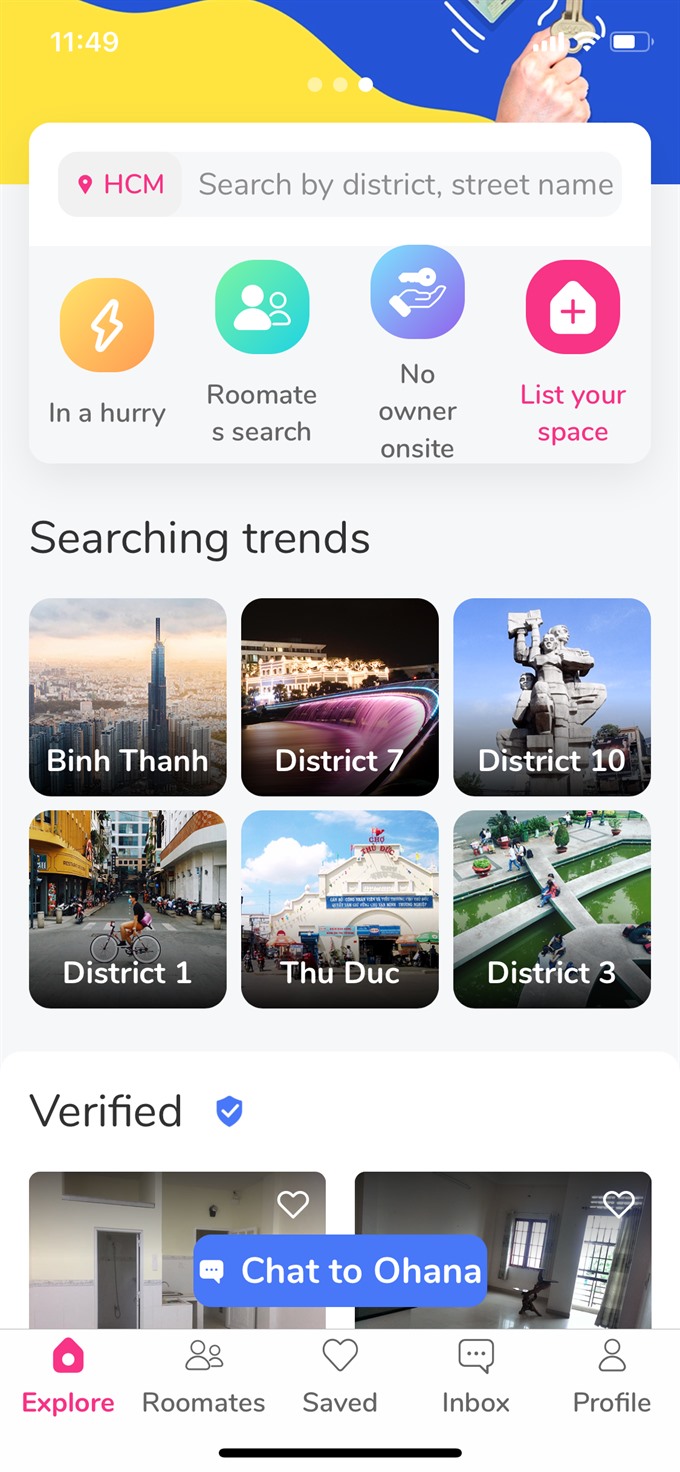 Features
Features

Cathy Thảo Trần, at the age of 27, is the CEO and founder of a company that has an app called Ohana connecting hosts and renters.
 |
| The Ohana app opens, helping students and young people in Việt Nam easily find a house in big cities. VNS Photo |
By Thu Ngân
HCM CITY – “If you have never lost your deposit while renting a house, you have not grown up yet.”
When a young woman entrepreneur said this in jest on Shark Tank, the reality TV show for start-ups, audiences laughed but recognised she was telling it as it was: it is risky and not easy to rent a house in Việt Nam.
For a long time the demand for rented houses and condos in cities has kept increasing, mostly from students who leave their hometown and move to cities for study.
Renting a house in cities has never been easy for students and other renters because of the high risk of losing one’s deposit or getting ripped off in the form of high rents.
Such problems could now become a thing of the past thanks to modern technologies as young entrepreneurs apply big data and use social media to create phone applications for house leasing services.
The young lady on Shark Tank is one such. Cathy Thảo Trần was able to raise VNĐ3.5 billion investment from the event. At the age of 27, she is the CEO and founder of a company that has an app called Ohana connecting hosts and renters.
“Home does not have to be a fixed geographic concept, it can be an emotional or spiritual state shared with great companions you meet along your life journeys,” she said.
Having lived abroad for 10 years and in various places like the US, Australia, Hà Nội, and HCM City, she came to realise the importance of one’s living space.
The idea of setting up such a service also came after she struggled to find a house when she came back to Việt Nam.
She put together a team and went on to build Ohana, a sharing app for students to find appropriate accommodation as well as housemates.
She explained: “Ohana leverages AI-powered technologies and the sharing economy model to solve the housing crisis in urban areas around Việt Nam by uniting renters to share housing resources.
“We look to serve the market for students’ housing first and foremost as we believe this is the most underserved segment in Việt Nam’s real estate market.”
After the Shark Tank programme, “the application is attracting up to 8,000 visitors per day. The number of rooms and the types of rooms in the application are also becoming more diverse.
“In the past we only had dormitories and rooms in the low-priced segment, but now we have all sorts of things. Some foreigners looking for a room also contacted us. This has potential; a new door has opened up for us.”
Ohana is not the only app to offer this kind of service.
Type the words “house renting app” in Google, and see how many results come up.
The most famous of them are Hello Rent, Doong, Landber, Timtro.vn, and batdongsan.com.vn.
A spokesperson for Landber, an application developed by Reway Group, told Việt Nam News they had launched it in 2016 with the main target of connecting renters and landlords and buyers and sellers around the country.
He said it mainly targets students and young people besides young families.
Since just April last year 80,000 users have downloaded the app on App Store and Google Play, indicating the market’s enormous potential.
“The house renting market in Việt Nam is huge and will not shrink in future. Social development will increase demand for renting houses in big cities.”
To meet the huge demand, the company has kept adding new functions to its app and website like finding real estate products on the map and users’ locations.
A student from the Financial Institute said she, like other students, feels very nervous every time a new school year starts.
“There are a dozen things to worry about: where to live, what kind of price it will be, how to avoid cheating.”
But the worries have been receding since a friend told her about some apps: all she has to do is fill up the necessary information, and the apps will quickly find for her the best options.
She said in the last two years finding accommodation has not been the hassle it used to be.
A young official living in HCM City, Như Thuỷ, has years of experience in renting houses.
She is from the Mekong Delta and has to find a new house at least once a year.
Thuỷ told Việt Nam News that she used to look for a house through friends or websites. However, since knowing about the apps, she prefers to use them, saying they are very “convenient”.
“There are clear pictures in the apps. They also connect directly to the landlord so that we can avoid brokers. I just put in my requirements, and information about housing that is suitable for me will appear.”
Obviously, the market has great potential and more and more young people are devoting their time and effort to develop more applications related to house renting.
It will be the users who will benefit most from this and the task of renting houses will become easier. VNS




